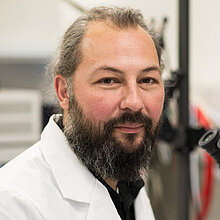Search
Displaying results 559 to 567 of 732.

Prof Dr Ursula Bilitewski
Head of Research Group
Compound Profiling and Screening
HZI Campus

Prof Dr Michael Meyer-Hermann
Head of Research Group
Systems Immunology
BRICS

Prof Dr Eva Medina
Research Group Leader
Infection Immunology
HZI Campus

Prof Dr Michael Kolbe
Head of Department
Structural Infection Biology
CSSB

Dr Fee Zimmermann
Research Group Leader
One Health Surveillance
HIOH

Dr Redmond Smyth
Research Group Leader
Genome Architecture and Evolution of RNA Viruses
HIRI

Dr Berit Lange
Acting Head of Department
Epidemiology
HZI Campus

Dr Berit Lange
Coordination
Epidemiology
HZI Campus

Prof Dr Dietmar Pieper
Head of Research Group
Microbial Interactions and Processes
HZI Campus